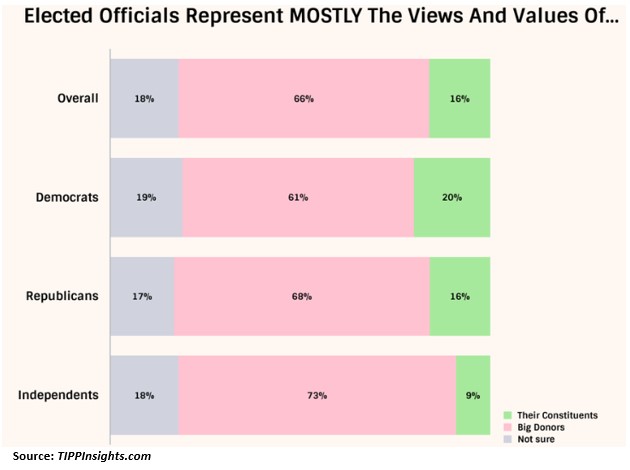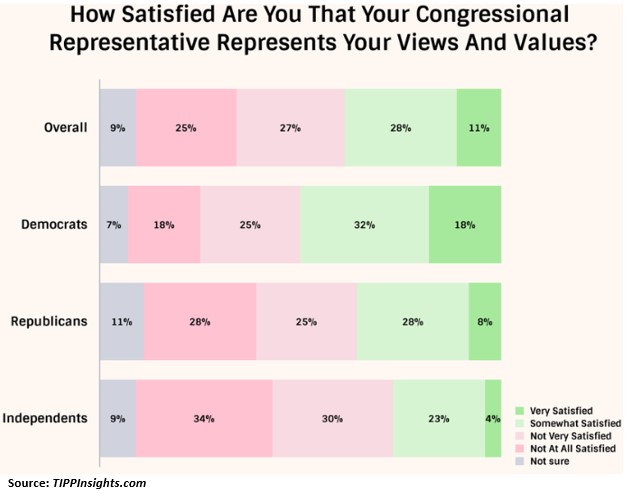I doubt today’s topic will come as a big surprise to my regular readers, but a recent poll found that about two-thirds of Americans believe their politicians favor big donors over the people who elected them. That’s a new high!
A recent poll conducted by Issues&Insights/TIPP found that voters from both parties agree the results of recent years from Washington have been less than stellar. And the voters feel Washington is divorced from their everyday concerns.
In the most recent online poll, taken in January from 1,107 registered voters across the country, I&I/TIPP asked voters two questions about their elected officials in Washington.
In the first question, I&I/TIPP asked simply: “In general, do you believe that elected officials in Washington represent MOSTLY the views and values of … ” with the choices being “their constituents,” “Big Donors,” or “not sure.”
The answer was overwhelming and doesn’t bode well for official Washington. Two-thirds (66%) said elected officials represent mostly the views and values of their big donors, not average Americans. Just 16% said they felt their elected officials represented their constituents. Another 18% said they weren’t sure.
I&I/TIPP also polled voters by political party, and the results are eye-opening. When it comes to the politics of those who took the poll, this was one of the most uniform responses in I&I/TIPP poll history.
Among Democrats, 61% said “Big donors,” compared to 68% of Republicans and 73% of Independents. “Constituents” garnered only 20% of Democrats, 16% of Republicans and just 9% of Independents. That is a stunning response!
So the political disgruntlement is deep, widespread and multi-partisan.
But there were some deeper demographic differences. Most notably, the older the person responding, the more likely they were to believe their elected officials were really representing the interests and views of those who gave them big bucks.
Among voters from 18-24 years of age, just 53% responded “Big Donors,” while 21% said their “Constituents.” That compares to the 25-44 age group who said 57% Big Donors, 24% their Constituents, the 45-64 age group (70% Big Donors, 13% Constituents) and age 65+, the most negative group at 75% Big Donors, compared to a mere 8% for their Constituents.
The older the voter, the more wary they are of their Washington representatives.
Race was another big difference. Among white voters, 71% said their representatives worked for their Big Donors, while a tiny 12% said for their Constituents. Among Black and Hispanic Americans, 52% felt their representatives reflected the views and values of their Big Donors, compared to 27% who responded their Constituents.
I&I/TIPP then asked one more closely related question, reflecting how people felt about their own personal representatives in Washington: “How satisfied are you that your congressional representative represents your views and values?”
Once again, voters were not happy. Just 39% of Americans said they were satisfied with their own personal congressional representative, while 52% said they were not satisfied.
This time, the political differences showed. Overall, 50% of Democrats called themselves “satisfied,” vs. 43% “dissatisfied,” with their representatives. Not so for Republicans or Independents. For GOP voters, just 36% said they were happy with their representatives, 53% unhappy.
By far, independents were least happy: Only 27% declared themselves “satisfied,” compared to a whopping 64% who said they were “dissatisfied.”
When it comes to budget, debt and taxes, recent opinion poll results have not been favorable either. A late-December poll of 1.6 million Twitter users asked: “Should Congress approve the [President Biden’s] $1.7 trillion omnibus spending bill?” Of those responding, a whopping 75.4% said no, while only 24.6% said yes.
Overwhelming! And yet, the bill was passed by the lame duck Congress and signed by President Biden, who hailed it as a great victory. Of course he did.
Will the new GOP-led House reverse all or part of the huge, unpopular spending bill? It remains to be seen.
On energy, the Republican House leadership has already vowed a “big energy package” early this year that aims to revive domestic fossil fuel production and the mining of critical minerals, with the goal of bringing down energy prices and restoring US energy independence.
As for immigration, fresh reports from US Customs and Border Protection (CBP) say that more than 1.2 million illegal immigrants “got away” since Joe Biden became president.
“The first half of Biden’s four-year term saw monthly border encounters rise from only 36,000 in February 2020 to 251,000 in December 2022, according to CBP stats.”
This has been a key sore spot among voters for years, but has grown since Biden took office and reversed Trump era policies – and following what has been, in effect, an open-border policy.
The bottom line is: many Americans increasingly believe big government at the federal level no longer listens to average people or shares their views. That’s dangerous for any elected government. But we’ll have to elect a new, more patriotic president to change it.



Sorry, comments are closed for this post.